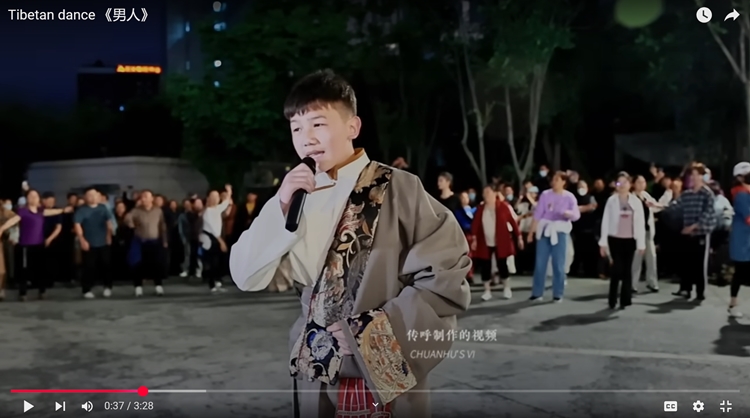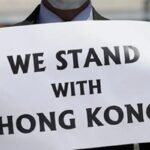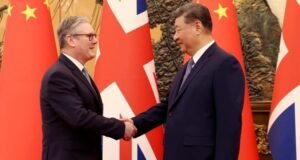
“Frontline” has posted its documentary “Battle for Tibet,” about the efforts of the Chinese Communist Party to subjugate Tibetan and how Tibetans have resisted, on YouTube. It aired on February 18, 2025.
It’s been 75 years since China invaded Tibet, the mountain territory it has long claimed as its own.
China heavily restricts the international media’s access to the region. It insists that human rights are at their “historical best,” and that Tibetans’ religious freedoms are being protected. But the footage and first-person accounts from exiled Tibetan interviewees in FRONTLINE’s “Battle for Tibet” paint a different picture.
The documentary investigates the Chinese Communist Party’s rule over the tightly-controlled territory and the struggle over the survival of Tibetan language, culture and religion.
The show early on highlights the alleged paradox of China’s insistence on calling the Dalai Lama a “separatist” or an “anti-China separatist” even though the Dalai Lama says Tibetans are not seeking independence.
“We are not seeking independence,” he says. “We are very much willing to remain within the People’s Republic of China, provided they should respect Tibetan culture, Tibetan unique language, and Tibetan environment.”
Then the basso profundo narrator says: “Nevertheless, China has continued to call the Dalai Lama an anti-China separatist and taken a hard-line stance on him.”
Nevertheless?
The Chinese government wants to mash Tibet into a uniform pulp of “Chinese culture,” which, however defined, is something markedly different from Tibetan culture and language and way of life. The Party has taken many vicious steps in hopes of accomplishing this, including sinicization of Tibetan Buddhism and mass shuttering of Tibetan schools and compelling Tibetan children to attend boarding schools that exclude Tibetan culture and language.
Who are the “we” in the Dalai Lama’s statement? Do no Tibetans seek independence?
Even supposing none do, there remains the possibility that many wish for independence, i.e., to be entirely free of Chinese rule. This must be a very high percentage, perhaps one hundred percent, of all those Tibetans who are willing to “remain within the People’s Republic of China, provided they should respect Tibetan culture, Tibetan unique language, and Tibetan environment.”
For the PRC is not respecting Tibetan culture, language, or environment. The condition is very far from being met and is unlikely to be met any time soon.
According to the Dalai Lama, then, Tibetans cannot be “very much willing to remain within the People’s Republic of China.” They are “separatists”—at least fervently wishing to be unencumbered by tyrannical CCP control even if they are not drawing up plans for rebellion—and the PRC’s conclusion that the Dalai Lama is a “separatist” is correct but for the indictment implied by putting it this way.
Other voices in the documentary:
Robert Barnett (author of Cutting Off the Serpent’s Head, 1994-1995): “All Chinese policy since 1994 has been based on that decision: Demonize the Dalai Lama. Blame him for everything as an individual….
“You can see why Communist officials would be really very uncomfortable about a charismatic leader like the Dalai Lama. They think that loyalty should be to the party, especially under Xi Jinping.
“They’re gradually reducing the content of the religion but not eliminating it. This is what they call sinicization of religion, so that it becomes less Tibetan.”
Victor Gao (a CCP propagandist): “For the Chinese government, for the Chinese nation, the thing is very simple. There is only one China, and Tibet is part of China. We need to defend China’s sovereignty and territorial integrity very fiercely. And China is always ready to defend China’s sovereignty and territorial integrity, regardless of whoever wants to instigate some crisis or confrontation.”
Undercover reporter: “I saw a lot of surveillance cameras. Almost every intersection had a police post…. Visiting a monastery in Tibet, you usually have to scan your identity card, and these machines do facial recognition.”
Greg Walton (a surveillance expert): “Digital surveillance in the monasteries is supplemented, augmented with perhaps six or seven thousand party officials installed in the monasteries. The desire to control, to instill a sense of fear, very deliberately create a chilling effect society-wide.”
Tsering Dawa (a Tibetan who communicated with a Tibetan rights group in India): “I told her on that there is no freedom in Tibet and we are not given passports. There is no freedom of religion and Tibetans are looked down upon. It’s like living in prison….
“For eleven months, [the police] detained me. During this time, you couldn’t see any sunlight inside the room. I tried to control my mind with Buddhist meditation.
“My biggest fear was not knowing what would happen in the future, and secondly, the fear of being put in prison for twenty years.”
Twenty years in prison is a possible punishment for campaigning for Tibetan independence, a charge that Tsering disputed. Eventually he fled Tibet.
“It is like a big prison, a massive prison. In this huge prison, via your phone you are being monitored, as to what you are thinking and what you are communicating to others.
“It’s very sad that I had to leave my homeland. However, I had no choice but to go. I feel I would be in prison if I had stayed.”
Gyal Lo (speaking about a call from his brother in 2016): “He said I should come home at once. He said both of the children [the brother’s grandchildren] had become strangely different. They’d forgotten the Tibetan they knew and could no longer speak it properly. The parents and the children couldn’t have a proper conversation with each other in Tibetan. I saw it was a serious matter….
“In 2017, 2018, 2019 and 2020 I traveled all around, visiting the schools to investigate….
“Listening to them and analyzing, there were two levels of teaching in the boarding schools for preschool children. One is to instill the communist ideology and the second is to instill Chinese culture…. These boarding preschools erase the fundamental mindset of Tibetan children from the age of 4 and replace it with a new Chinese mindset. Over the next 15 to 20 years, if boarding schools continue, Tibetan national culture and identity will be completely destroyed.”
Tibetan student: “Let me say it here. As students in the new era, we should teach our parents Mandarin.”
Also see:
Frontline: YouTube video: “Battle for Tibet”
传呼 @chuanhu5533: YouTube video: “Tibetan dance”











